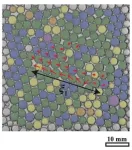(Press-News.org) Efforts to improve the social success of autistic adolescents and adults have often focused on teaching them ways to think and behave more like their non-autistic peers and to hide the characteristics that define them as autistic. Psychology researchers at The University of Texas at Dallas, however, have been focusing on another approach: promoting understanding and acceptance of autism among non-autistic people.
The researchers published their findings online Jan. 20 in the journal Autism. The study showed that familiarizing non-autistic people with the challenges and strengths of autistic people helped to reduce stigma and misconceptions about autism, but implicit biases about autism were harder to overcome.
Desiree Jones, a psychology doctoral student in the School of Behavioral and Brain Sciences (BBS), is the corresponding author of the paper, and Dr. Noah Sasson, associate professor of psychology, is the senior author.
Autism is characterized by differences in thinking, sensing, and communicating that can make interaction and connection with non-autistic people difficult. Some autistic people are nonspeaking and need a lot of support in their everyday lives, while some are highly verbal and need less support. Jones' work focuses specifically on the experiences of autistic adults without intellectual disability.
"Previous work in our lab has shown that autistic people are often stereotyped as awkward and less likeable," Jones said. "Some might think that autistic people don't want friends or don't want to interact with people. We want to combat those ideas."
Promoting autism knowledge among non-autistic adults represents a shift in philosophy about how to improve the social experiences of autistic people. Jones explained that this tactic borrows from research on race and ethnicity.
"Targeting autistic behavior places the burden of social exclusion on autistic people, when we should really be challenging the attitudes that lead others to stigmatize autistic behaviors," she said. "Research on race suggests that people who have racial biases tend to view that race as a monolith, assigning every member the same features. By exposing them to different people from the group, you can challenge those stereotypes. We believe the same principle applies to autism."
The study participants -- 238 non-autistic adults -- were split into three groups. One group viewed an autism acceptance video originally developed as a PowerPoint presentation by researchers at Simon Fraser University in British Columbia in collaboration with autistic adults. Jones updated it and had narration added. The second group watched a general mental health training presentation that didn't mention autism, and the third received no training at all. Participants then were tested on their explicit and implicit biases about autism.
"The autism video presents autism facts and promotes acceptance. It gives tips on how to befriend an autistic person and talk to them about their interests," Jones said. "It also discusses things to avoid, such as sensory overload and pressuring them into engaging."
Subsequent testing of explicit biases included capturing first impressions of autistic adults in video clips, measuring participants' autism knowledge and stigma, and gauging their beliefs about autistic functional abilities. Implicit biases also were examined, gauging whether participants unconsciously associate autism with negative personal attributes.
As anticipated, the autism acceptance training group demonstrated greater understanding and acceptance of autism on the explicit measures, including expressing more social interest in autistic adults and resulting in more positive first impressions. However, participants continued to implicitly associate autism with unpleasant personal attributes regardless of which training they experienced.
"Explicit biases are consciously held, evolve quickly and are constrained by social desirability," Sasson explained. "Implicit biases reflect more durable underlying beliefs -- associations reinforced over time that are more resistant to change."
Many of the stubborn stereotypes about autism are reinforced by portrayals in the media, whether from TV shows like "The Good Doctor" or movies like "Rain Man."
"A common trope exists of the white male autistic person with savant abilities," Jones said. "They are really smart but very socially awkward. They can be portrayed as flat or without emotion or passion. These beliefs can be harmful and do not reflect how variable these characteristics are among autistic people. They belie the range of unique difficulties and skills that autistic people can have.
"There's a saying that if you've met one autistic person, you've met one autistic person. The community varies so much in individual needs, strengths and difficulties that there's not a very useful prototype. So getting to know actual people and getting away from preconceptions can hopefully help us improve social outcomes for the autistic community."
Jones said that autistic individuals themselves are integral in plotting the path forward.
"Autistic people often feel that they simply aren't listened to, that they are dismissed or not cared about," she said. "A big part of being welcoming is simply acknowledging actual autistic people telling us what they like and what they want research to be. In our lab, we have several autistic master's and undergraduate students who play a big role in our research, and they've taught me a lot."
Sasson described the results as promising and indicative of the promise of well-done training, although the staying power of such effects remains unclear.
"This half-hour presentation was engaging and entertaining and included a lot of compelling first-person narratives," he said. "The fact that non-autistic people experiencing the training were more interested in social interaction with autistic people, had fewer misconceptions about autism, and reported more accurate understanding of autistic abilities after completing it is a success story of sorts.
"Whether the effects persist over time is another question. It could very well be that the benefits are transient, which would significantly limit the promise of training programs like this."
In future work, Jones and Sasson hope to establish a connection between inclusion and acceptance and the mental health and well-being of autistic people, who experience higher levels of depression, anxiety and suicide than the general population.
"It's not easy to be autistic in a predominantly non-autistic world, and making the social world a bit more accommodating and welcoming to autistic differences could go a long way toward improving personal and professional outcomes for autistic people," Sasson said.
INFORMATION:
BBS doctoral student Kilee DeBrabander was the third author of the study, which was funded by a grant from the Texas Higher Education Coordinating Board's Autism Grant Program.
Beer-Sheva, Israel...February 8, 2021 - A new discovery by researchers from Ben-Gurion University of the Negev (BGU) and its affiliated Soroka University Medical Center shows that medical cannabis may reduce blood pressure in older adults.
The study, published in the European Journal of Internal Medicine, is the first of its kind to focus on the effect of cannabis on blood pressure, heart rate and metabolic parameters in adults 60 and above with hypertension.
"Older adults are the fastest growing group of medical cannabis users, yet evidence on cardiovascular safety for this population is scarce," says Dr. Ran Abuhasira of the BGU Faculty of Health Sciences, one of Israel's leading medical ...
It's well understood that a difficult childhood can increase the likelihood of mental illness, but according to new research from the University of South Australia, a happy and secure childhood does not always protect a child from developing a mental illness later in life.
Conducted in partnership with the University of Canberra, the finding is part of a study published in Current Psychology, which examined how early childhood experiences relate to different developmental pathways, and how these might be associated with poor mental health.
Given that both positive and negative childhood experiences were found to manifest as anxiety or other mental health disorders into adulthood, ...
Tokyo, Japan - Researchers from Tokyo Metropolitan University studied the dynamics of foams. When a drop of water was added to a foam raft, the bubbles rearranged themselves to reach a new stable state. The team found that bubble movement was qualitatively different depending on the range of bubble sizes present. Along with analogies with soft-jammed materials, these findings may inspire the design of new foam materials for industry.
Foams are everywhere. Whether it's soaps and detergents, meringues, beer foam, cosmetics or insulation for clothing and building, we're surrounded by everyday ...
There is an urgent need for guidelines on how schools can use ventilation to reduce the risk of COVID-19 transmission in the classroom, according to doctors at Imperial College London and the headteacher of a secondary school in Pinner, Middlesex. In a commentary published by the Journal of the Royal Society of Medicine, the authors say that improving air quality in classroom spaces should be as important as following government advice regarding social distancing, mask-wearing and hand washing.
The authors point to lessons from the airline industry, where the risk of contracting COVID-19 on a flight ...
6 February: The IMbrave150 trial found median overall survival was 19.2 months in patients treated with atezo+bev vs 13.4 months for those treated with sorafenib alone, the current standard treatment (HR, 0.66 [95% CI, 0.52-0.85]; P=0.0009). Survival at 18 months was 52% with atezo+bev and 40% in patients treated with sorafenib.
All patients in the trial had nonresectable HCC - the most common form of liver cancer - and had not previously been treated with systemic therapy. A total of 501 patients were treated in the multicentre, open label, randomised controlled trial and the new follow-up figures confirm the superiority of the atezo+bev combination over sorafenib in this group of patients with HCC.
Atezolizumab is an immune ...
Around one in three working-age adults (29%) surveyed in France in July 2020 would refuse any COVID-19 vaccine.
Willingness to receive a COVID-19 vaccination depended upon its country of origin, effectiveness, rate of serious side effects, and site of vaccination.
Although attitudes may have changed since July 2020 with the approval of several vaccines and a second wave of COVID-19, the findings suggest that communicating the collective benefits of herd immunity reduced people's hesitancy about being vaccinated.
Nearly one in three working-age adults in France (29%) surveyed in July 2020 - when lockdown restrictions had been ...
TORONTO (February 5, 2021) - A clinical study led by Dr. Jordan Feld, a liver specialist at Toronto Centre for Liver Disease, University Health Network (UHN), showed an experimental antiviral drug can significantly speed up recovery for COVID-19 outpatients - patients who do not need to be hospitalized.
This could become an important intervention to treat infected patients and help curb community spread, while COVID-19 vaccines are rolled out this year.
"This treatment has large therapeutic potential, especially at this moment as we see aggressive variants of the virus spreading around the globe which are less sensitive to both vaccines and treatment ...
NEW YORK, NY (Feb. 5, 2020)--Cells used to study the human blood brain barrier in the lab aren't what they seem, throwing nearly a decade's worth of research into question, a new study from scientists at Columbia University Vagelos College of Physicians and Surgeons and Weill Cornell Medicine suggests.
The team also discovered a possible way to correct the error, raising hopes of creating a more accurate model of the human blood-brain barrier for studying certain neurological diseases and developing drugs that can cross it.
The study was published online Feb. ...
Washington, DC, February 5, 2021 - A study in the Journal of the American Academy of Child and Adolescent Psychiatry (JAACAP), published by Elsevier, reports that in a diverse, cross-national sample of youth, physical discipline and cognitive deprivation had distinct associations with specific domains of developmental delay. The findings are based on the Multiple Indicator Cluster Surveys, which is an ongoing, international household survey initiative coordinated and assisted by the United Nations agency, UNICEF.
"Physical discipline and cognitive deprivation are well-established risks to child development. However, it is rare that these experiences are examined in relation to each other," said lead author ...
UNIVERSITY PARK, Pa.-- When actor Tom Hanks announced his COVID-19 diagnosis on March 11, 2020, many Americans were still learning about the virus and its severity. According to new research, Hanks' announcement may have affected how some people understood the virus and their behavior toward its prevention.
The day after Hanks posted the news on social media, Jessica Gall Myrick, an associate professor in the Donald P. Bellisario College of Communications at Penn State, and Jessica Fitts Willoughby, associate professor at Washington State University, surveyed 682 people about their attitudes and behaviors toward COVID-19.
Just under 90% of the people surveyed had heard about Hanks' social ...


